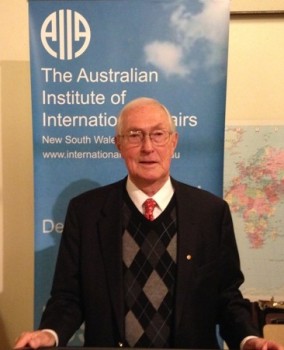The 1965 attempted "Coup" in Indonesia - "The Year of Living Dangerously"
“The Year of Living Dangerously” – with speaker Geoff Miller AO at Glover Cottages, Tuesday 25th August
On 1 October 1965, an attempted coup took place in Jakarta, the consequences of which changed national life in Indonesia. The immediate results of its quick collapse were a change in the power balance in Indonesian politics, the purge of the Communist Party and the death of hundreds of thousands of Indonesians, not all of them PKI adherents. In the longer term, President Sukarno was forced to relinquish his powers to Indonesia’s second president, Suharto. Under the latter, Indonesia became less prickly towards its neighbours and more pro-western in general.
Almost 50 years later to the day, distinguished diplomat, former head of the Office of National Assessments, and a former president of AIIA NSW and national vice president, Geoff Miller, spoke to an engaged crowd at Glover Cottages about the events. At the time Geoff had been a young Australian diplomat in Jakarta.
In early 1965, Geoff recalls, Jakarta was terribly run-down. Inflation was out of control. Power, telecommunications, food supplies were all uncertain. President Sukarno cared more about crushing Malaysia and gaining control over West New Guinea than nurturing the economy. Ill-judged parachute drops into Western Malaysia and Eastern Borneo led to military confrontation with British and Australian troops. Sukarno took Indonesia out of the UN, and confected bodies of ‘new emerging forces’ to replace it. Domestically he created NASAKOM from the Indonesian words for nationalism, religion and communism. The Indonesian Communist Party PKI under D. N. Aidit prospered, but Muslims, significant numbers of PNI nationalists, and most in the Army, did not. For a time, Sukarno’s personality and political skills overrode the doubters, but there were clashes in the countryside, where landholders resisted attempts by the PKI unilaterally to enforce land re-distribution. Things came to a head in Jakarta on 1 October 1965. Six Army generals had been shot the night before by a rebel military group, the ’30th September Movement’. Rumours of coups and armed clashes swirled through the city. Sukarno positioned himself at Halim Air Force Base, as did Defence Minister Nasution and PKI leader Aidit. Meanwhile, General Suharto, the Army’s Number Two and head of KOSTRAD Strategic Command, took effective action to squash the Movement.
Who were the main actors in the drama? Geoff thought the PKI was probably behind it. It had no military arm, but it did have a huge mass base of three million members. The six killings were designed to ‘cut the head’ off the Army leadership, whereafter the Party would rely on military support from other officers it had cultivated over the years, and on Sukarno’s favour. And President Sukarno had a pretty clear idea of PKI machinations. Throughout the rest of 1965 and during 1966 and 1967, Sukarno tried to shore up his popular support, but failed to appreciate the degree of popular outrage at the military assassinations. Intensive manoeuvring between Sukarno and Suharto followed, Sukarno gradually losing ground, culminating on 12 March 1967, when the parliament conferred on Suharto the title of Acting President. Suharto then began to position Indonesia into a more comfortable international position than had Sukarno. He initiated its rejoining the United Nations. He rehabilitated the economy, ended Konfrontasi, and through ASEAN councils, led the country into its natural role as Southeast Asia’s leading country.
Report prepared by Richard Broinowski
